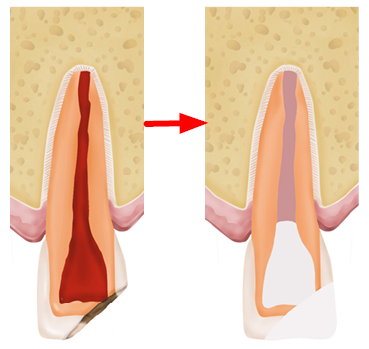Why does your child require root canal treatment?
Root canal treatment may be needed when the pulp (nerve) inside the tooth becomes very inflamed or infected. This can happen due to decay, deep or fractured fillings and trauma.
Eating a healthy, balanced diet, practicing excellent oral hygiene and wearing a sports guard for contact sports can help to avoid these things. Root canal treatment aims to clean out the inside of the tooth and treat any infection to enable the tooth to be kept for as long as possible.
What happens if your child does not have root canal treatment?
There is a risk of developing:
- Pain
- An abscess
- Facial swelling

What happens during root canal treatment?
Some root canal treatment can be difficult. Your child has been referred because this treatment cannot be completed by their family dentist. The treatment will involve multiple appointments with each appointment lasting between 1-3 hours.
At the first visit
- The tooth may need to be made numb to prevent discomfort. This is done by using numbing jelly and a local anaesthetic injection.
- A protective tooth cover called a rubber dam is placed over the tooth. This protects the rest of your child’s mouth during the treatment and keeps the affected tooth as clean and dry as possible.

- The tooth is cleaned through a hole prepared in the surface.
- X-ray pictures will be required to measure the tooth length.
- Medication may be placed inside the tooth and a temporary filling placed to cover the hole in the tooth.
Filling inside the tooth
If there are no signs of infection and pain, the root of the tooth can be filled with a root filling material.

For older children, the end of the root is likely to be closed.

For younger children, the end of the root may be open. A barrier may need to be placed to allow the rest of the root to be filled.
If there are further signs of infection, it may be necessary to clean the inside of the tooth again, delaying filling to the next appointment.
Treatment success
Root canal treatment normally has a high success rate but this does vary depending on the tooth. It is important to discuss this with the dentist before treatment starts. Despite best efforts, results cannot be guaranteed and the infection may continue or return. The tooth may then require re-treatment, surgery, or removal.
Treatment risks
- Leakage of tooth cleaning products into the mouth.
- Escaping of cleaning rinses through the end of the root into the soft tissues.
- Small dental instruments breaking within the tooth root.
- Damage to the tooth or root during treatment (perforation).
- Unable to find nerve due to blockage in the root.
- Post-treatment discomfort or swelling.
- Incomplete healing or re-infection after completion of root canal treatment.
- Tooth discolouration does not usually occur as a result of treatment, but may occur due to the initial injury to the nerve.
Will root canal treatment hurt?
During the treatment, the tooth is made numb with local anaesthetic and therefore the treatment does not hurt.
After treatment, the tooth may feel sensitive or tender. Over-the-counter pain-relieving medicines such as paracetamol or ibuprofen can be taken if there is no contraindication to their use.
Very occasionally, the tooth may be very painful or a swelling develops. If this occurs contact the Leeds Dental Institute or your family dentist for an appointment during normal opening hours.
Where can I find more information about the treatment?
The British Endodontic Society NHS ChoicesContact details
Between 9am-5pm Monday – Friday – Leeds Dental Institute Paediatric Dental Clinic:
- Paediatric Dental Reception: (0113) 343 6229 or
- Paediatric Dental Booking Team: (0113) 343 5711
- Leeds Dental Institute Switchboard (0113) 244 0111
Out of hours
Contact your family dentist who may be able to see you out of hours or call the NHS 111 helpline to schedule an emergency dental appointment.
Attend your local Accident and Emergency Department if there is spreading infection, fever, facial swelling or difficulty breathing.